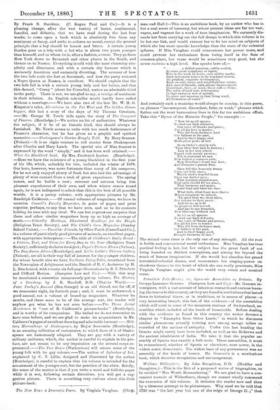The New Era: a Dramatic Poem. By Virginia Vaughan. (Chap.
man and Hall.)—This is an ambitions book, by an author who has in her a real sense of harmony, but whose present ideas are far too vast, vague, and vagrant for a work of true imagination. We earnestly dis- suade her from carrying out the full design in which this volume is to be but one link, and would entreat her to fix her mind on subjects of which she has more specific knowledge than the state of the celestial spheres. If Miss Vaughan could concentrate her power more, and could prevent her enthusiasm from losing itself in the flats of common-place, her verse would be sometimes very good, but she never sustains a high level. She speaks here III a skilled musician, subtly-soulod,
At some great symphony or opera,
Who in the work he hears, each motive marks, Each movement traces in its wayward course, Its gradual, exquisite development,
Each sweeter strain and wing &I phrase enjoys, And, jarred thereby, each phrase inconsequent, Discordant, false, or weak, these suffers from; The value of each note determining In that enwoven web of melody, Its place and meaning in that living woof, All tremulous of sound."
And certainly such a musician would always be coming, iu this poem, on phrases "inconsequent, discordant, false, or weak," phrases whiela flatten out the most harmonious lines in this far too ambitions effort. Take this " Hymn of the Miranito People," for example :-
" Now let us all upraise
To God our high defender, One voice of thanks and praise, For all his love so tender; Who did from darkness 'mid Our fathers in the past, And to their happy seed Bath given peace at last.
Stern Order's stately rule 'Twas their first task to fashion ; Law in her iron school Tamed each unruly passion ; Till in restraint we saw How lurked a common gain, How Freedom's fount was Law, And Pleasure's parent Pain.
Then fell this heavenly dream Upon our holy sages, Which shed a hopeful beam Upon our darker ages;
That jealousy should cease, That each should fill his place, That harmony and peace, Should bind and bless the race.
What toils, what fears were theirs Whose conquests we inherit, 'Tis meet that we, their heirs, Pay tribute to their merit : And let ns, as is fit In progress still ascend,
And age to age transmit,
New blessings without end.
So let us all upraise To God our high defender, One voice of thanks and praise, For all his love so tender. Who did from darkness lead, Our fathers in the past, And to their happy seed, Brought harmony at last."
The second verse there is the only one of any strength. All the rest is feeble and conventional moral enthusiasm. Miss Vaughan has truer poetical feeling in her, but her subject has the great fault of not being founded on distinct conceptions, and aiming far beyond the reach of human imagination. If she would but abandon her grand terrestrial-celestial drama, and concentrate her singing-power on slenderer themes to the heart of which she can really penetrate, Miss Virginia Vaughan might give the world very sweet and musical verse.






































 Previous page
Previous page